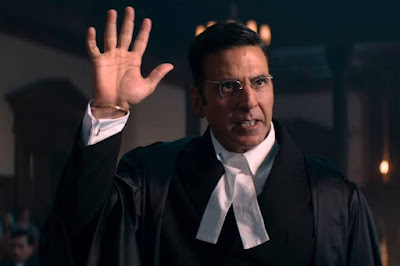So we have a franchise: Akshay Stirs Shit Up While Setting The Past Right. Proven facts remain visible in KC2: the appalling brutality of the massacre itself, the case brought against the Crown by Nair. Yet more often than not, you sense these facts being co-opted - conscripted, even - by a dramatisation that plays as utterly flimsy when it's not ripely overcranked; so much piffle has been applied to the past that even the proven facts start to seem piffling. It begins during the massacre itself, and the clumsy inserts of British officers all but sticking their riflebutts up the nostrils of wide-eyed young children; it persists into this script, which smacks its lips with relish whenever one of the dastardly oppressors hones into view. There they go again, harassing old ladies, tearing up crucial documents, perjuring themselves, or pointing out with a smirk that Indian citizens enjoyed the same status in the gentlemen's clubs of the Raj as dogs. (Kumar's Nair briefly offers site-specific pushback in this respect, glancing across the urinals at a peeing British adversary and gravely noting "the Empire is shrinking".) It's far from inaccurate to portray the Brits at Jallianwala Bagh as baddies - this is one of the film's more truthful generalisations, all told - but these are never especially compelling baddies. Simon Paisley Day, as the loathsome General Dyer (memo to history: bit on the nose, that), speaks a commendable amount of his own Hindi rather than submitting to the indignity of a botchjob dub, but he has only one note to play throughout: the pinched constipation of a man who hasn't opened his bowels since the Second Boer War. These aren't characters, so no real drama flows from them; they're the straw men so many nationalist arguments rely on, nailed haphazardly to the screen so as to aggravate before being cut down.
They do, however, make a perfect match for a not terribly compelling hero. By most accounts, the real Sankaran Nair was a fascinating, conflicted Establishment figure; yet the movie instead gives us Saint Akshay, whose internal struggles are instantly rendered moot by the way KC2 has been conceived, pictorialised and scored. You don't need a sentient actor in this part (and I shall take the higher ground and resist the obvious joke); shot from the right angle, in the right light, and with the orchestra cranked up to eleven as it often is here, a mop would do the job just as effectively. Ananya Panday, the Dharma discovery whom you might think would appear somewhat out of place in a 1920s courtroom (like, where's the wifi?), has a strong opening scene in which she confronts Nair, those big eyes burning with injustice; she also plays her part in the one noteworthy movie image, her pristine white robes popping out of a crowd of establishment black silk. Yet increasingly this camera regards her as somewhere between an intern and a beneficiary of Bring Your Daughter to Work Day. "We have to keep my involvement secret," Nair tells her early on, but within minutes, our guy is giving forth at the bench, and rarely thereafter stops. If he seems ill-briefed throughout, it's because the writing has little to no interest in legal strategy and the process of discovery: Nair pulls intel from the air like a conjuror does rabbits from a hat, and the sorry facts of this case matter far less than the stage the courtroom provides to make the kinds of speeches these films trade in. "How's that for a confession?," asks Kumar at one point, turning towards the camera as Axar Patel would the umpire. Alas, this just isn't cricket. The nonsense Kesari entered into the record was half-funny, in a big dumb movie way; here, it falls somewhere between exasperating and infuriating, because it reduces a meaningful story to the crassest movie slop. The star has taken the film's success on home soil to announce plans for a Kesari Chapter 3: I have an awful feeling I'm going to spend some part of the rest of my days watching Akshay Kumar Photoshopping himself into the most turbulent moments of India's history, like the world's worst Forrest Gump impersonator.
Kesari Chapter 2: The Untold Story of Jallianwala Bagh is now showing in selected cinemas.

OH OF COURSE WHAT ELSE YOU CAN SAY, WHEN YOUR TRUTH GETS EXPOSED TO THE WHOLE WORLD...AND PERHAPS IT WILL PASS TO YOUR NEXT GENERATIONS TOO !!!! WATCHOUT
ReplyDelete